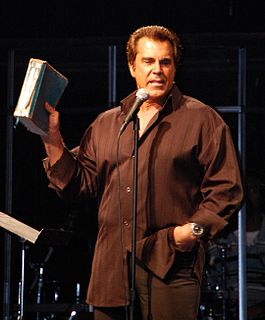A Quote by Roger E. Olson
The biblical writers didn't need to say everything; they could assume some things. They didn't anticipate a day when even Jews and Christians would fall under influences of non-biblical religions, philosophies, and worldviews, to the extent that is now the case in our pluralistic culture and society.
Related Quotes
We, including many Christians, read the Bible through "eyes" conditioned by, and even accommodated to, modern Western culture plus the influences of messages and ideas from other cultures that are alien to the worldview of the biblical writers. Therefore, in order fully to understand the Bible and allow the Bible to absorb the world (rather than the world - culture - absorb the Bible) we must practice an "archaeology" of the biblical writers' implicit, assumed view of reality.
Why are you uncomfortable with the supernaturalist worldview of the biblical writers? Evangelicals don't want to just say, "Well, the inspired writers were wrong about some of their beliefs about the spiritual world and its inhabitants." That really doesn't work in a confessional situation! So instead we come up with excuses and interpretations that allow us to remake the biblical writers in our own post-Enlightenment image. I understand that impulse, but it's not honest.
There's nothing easy or simple or even entertaining (in our contemporary American sense of that word) in disciplining our minds to "see" reality through biblical lenses; it takes effort and time. But Christians who don't take that effort and time will inevitably succumb to some of the anti-biblical and anti-Christian messages that bombard us every day through advertising, entertainment, etc.
Archaeology in general is the recovery and study of the material culture of past civilizations. Biblical archaeology is as an application of the science of archaeology to the field of biblical studies. Through the comparison and integration of Scripture with the evidence of history and culture derived from archaeology, new insights into the biblical context of people and events, and sometimes the interpretation of the text itself, are possible. In this way archaeology serves as a necessary tool for biblical exegesis and for apologetic concerns.
I think we are affected so much by mythical stories and biblical stories, our society being based on the Bible - at least the old society is based on biblical terms and laws - that there's more of it in art than people realize. Sometimes it comes to the surface, but sometimes it's below the surface, but certainly, it does influence some of my movies.
There is a reason Christianity is violently opposed in our world while other religions and philosophies are tolerated... Biblical Christianity evokes violent responses from some people, because only in Christianity is there an absolute right and wrong. People hate the Bible and Christianity because of the law of God.
Is it our task to force the biblical doctrine of God to answer to modern culture, or (is it our task) to address modern culture with the biblical doctrine of God? If modern culture-or any culture-establishes the baseline for the doctrine of God, such a doctrine will certainly bear little resemblance to the God of the Bible.
Biblical archaeology was developed early in this century in an effort to substantiate the authenticity of the Biblical account. It's by now generally recognized in Biblical scholarship that it has done the opposite. The Bible is not a historical text, and has only vague resemblances to what took place, as far as can be reconstructed. For example, whether Israel ever existed is not clear; if so, it was probably a small kingdom somewhere in the hills, apparently virtually unknown to the Egyptians.




























